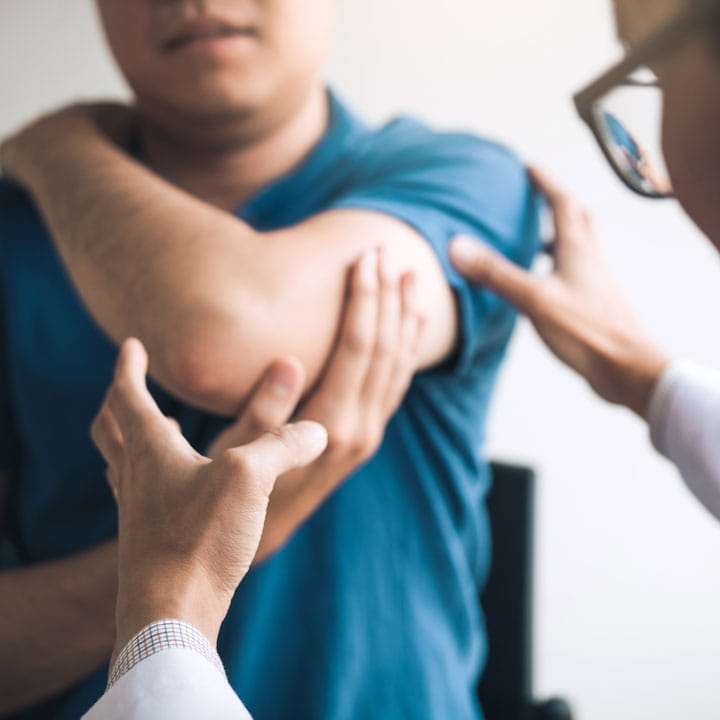
Researchers combine nanobiotechnology, neutrophils and nucleic acid to combat lupus
 “In our clinic, a patient is seen by both a rheumatologist and a neurologist from the very beginning,” says Myositis Clinic co-director and Ohio State Wexner Medical Center rheumatologist Jisna Paul, MBBS, who leads the Myositis Clinic with neurologist Bakri Elsheikh, MBBS. “This allows us to diagnose and address every aspect of the disease more quickly. Depending on how the myositis presents, we can also consult with other experts within the multidisciplinary clinic, including respiratory and physical therapists, registered dietitians, social workers and clinical pharmacists who are available on-site — important for a rare disease like this — and provide patients access to a comprehensive diagnostic approach.”
“In our clinic, a patient is seen by both a rheumatologist and a neurologist from the very beginning,” says Myositis Clinic co-director and Ohio State Wexner Medical Center rheumatologist Jisna Paul, MBBS, who leads the Myositis Clinic with neurologist Bakri Elsheikh, MBBS. “This allows us to diagnose and address every aspect of the disease more quickly. Depending on how the myositis presents, we can also consult with other experts within the multidisciplinary clinic, including respiratory and physical therapists, registered dietitians, social workers and clinical pharmacists who are available on-site — important for a rare disease like this — and provide patients access to a comprehensive diagnostic approach.”
Dr. Elsheikh emphasizes the range of testing resources available within the clinic space. “After the patient examination, we begin with serological and blood tests and manual muscle testing with a physical therapist. If needed, we will also conduct pulmonary function studies, EMG/nerve conduction tests, pinpoint the affected muscles with an imaging option like MRI or neuromuscular ultrasound and collect a muscle biopsy,” he says. “We do everything possible to schedule multiple appointments for the same day so it’s convenient for the patient. Being considerate of their schedule is a gesture that matters, and it’s a great way to establish a partnership right away.”
Depending on the patient’s type of myositis, Ohio State’s dedicated clinic is designed to provide seamless access to care. Treatment is available for various idiopathic inflammatory myopathies, including polymyositis; dermatomyositis, including antisynthetase syndromes; overlap myositis; autoimmune necrotizing myositis; and inclusion body myositis.
“We have state-of-the-art options for these patients,” Dr. Paul says. “That includes a full range of oral/IV medications, an on-site infusion center and on-site specialty pharmacists who can help with prior authorization and dosing, which is important because some of our medications are prescribed for off-label use and can be quite expensive without coverage.
“Even if a patient develops less common symptoms or symptoms not directly related to myositis, we can easily refer to another medical center expert, such as a pulmonologist or dermatologist, and arrange an expedited appointment. For example, if a patient develops dysphagia, Ohio State has central Ohio’s only Voice and Swallowing Clinic. This helps us to easily monitor the various manifestations of myositis and provide better care.”
In addition to her clinical practice and teaching responsibilities as a clinical assistant professor of Internal Medicine in the College of Medicine, Dr. Paul is leading Ohio State’s participation in myositis clinical trials with Dr. Elsheikh.
“The Myositis Clinic’s model of care is like that found in the field of oncology, where access to clinical trials is a central focus. Just as oncologists have been able to transform cancer treatment and dramatically improve outcomes through a broad effort of aggressive clinical trial creation, management and recruitment, it’s our hope that the same kind of transformative care will be available for patients with myositis,” she says.
The Myositis Clinic also collaborates with basic scientists at Ohio State with the goal of finding new targets for future therapies. Some of the newest research, conducted with mouse models and serum samples from patients with idiopathic inflammatory myopathies, show that some of the antibodies are targeting proteins that are important in repair of the cell membrane in muscle cells.
Any physician or patient interested in exploring studies that are actively recruiting can find more detail at Ohio State’s Study Search.
The Myositis Clinic at Ohio State does require a referral. To do so, physicians or other care providers can call the clinic directly at 614-293-4837 or fax a referral form to 614-293-1456.